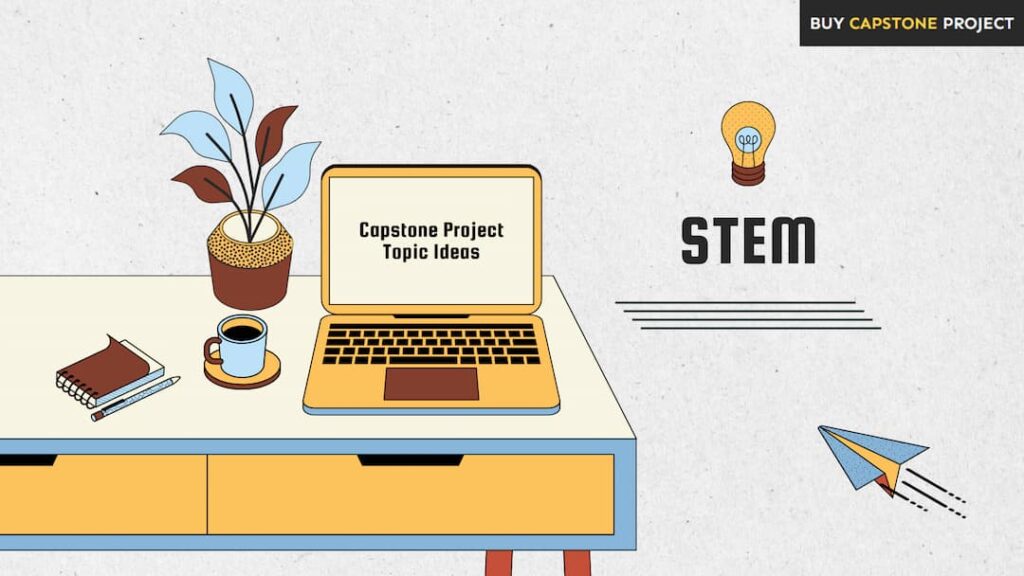Science, Technology, Engineering, Mathematics Capstone Project Topics
1. Renewable Energy Technologies
Research Question 1:
How do advances in solar panel materials affect energy conversion efficiency?
Overview: Students can review experimental data and recent material studies to compare efficiency improvements.
Research Question 2:
What impact do wind turbine design modifications have on power generation in varied environments?
Overview: Analyze design parameters and performance data from different turbine models to identify key factors.
Research Question 3:
How does the integration of renewable energy sources influence grid stability?
Overview: Investigate simulation models and case studies to understand the challenges and benefits of integrating renewables.
2. Artificial Intelligence in Healthcare
Research Question 1:
What are the effects of machine learning algorithms on early disease detection?
Overview: Students may analyze clinical datasets and compare the accuracy of different algorithms in predicting diseases.
Research Question 2:
How does AI-powered diagnostic support improve treatment planning in hospitals?
Overview: Evaluate case studies and clinical outcomes to assess the benefits of AI assistance in decision-making.
Research Question 3:
What challenges exist in implementing AI tools in patient care settings?
Overview: Review policy documents, technical reports, and gather feedback from healthcare professionals to identify common obstacles.
3. Internet of Things (IoT) in Smart Cities
Research Question 1:
How does IoT technology improve traffic management systems in urban areas?
Overview: Compare data from smart traffic systems and traditional methods to measure efficiency improvements.
Research Question 2:
What role do sensor networks play in urban environmental monitoring?
Overview: Analyze data collected from sensor networks and evaluate how it influences city planning and pollution control.
Research Question 3:
How can IoT solutions enhance public safety services in smart cities?
Overview: Study case examples and technical specifications of security systems to determine their impact on response times and safety.
4. Robotics in Manufacturing
Research Question 1:
How does the integration of collaborative robots affect production line efficiency?
Overview: Examine production metrics and employee feedback to assess improvements in workflow and safety.
Research Question 2:
What factors influence the adoption of robotics in small and medium-sized enterprises?
Overview: Conduct surveys and analyze economic data to identify barriers and enablers for robotics implementation.
Research Question 3:
How do advanced robotics systems reduce error rates in precision manufacturing?
Overview: Compare performance records before and after robotics integration to evaluate reductions in manufacturing defects.
5. Data Science and Big Data Analytics
Research Question 1:
How can big data analytics improve decision-making processes in business operations?
Overview: Analyze case studies and datasets to show how data-driven insights can influence strategic decisions.
Research Question 2:
What challenges arise when managing large-scale datasets in real time?
Overview: Investigate technical, security, and privacy concerns through literature reviews and industry reports.
Research Question 3:
How does data visualization impact the interpretation of complex data sets?
Overview: Evaluate different visualization tools and user feedback to determine which methods enhance understanding and communication.
Yo, STEM squad, if your capstone project’s got you tangled up in complex formulas and lab reports, we’ve got the hookup with our capstone project writing experts that’ll make your work shine. Let’s crush this assignment and leave your professor in awe!
6. Cybersecurity and Information Privacy
Research Question 1:
What methods are most effective in detecting cybersecurity breaches in real time?
Overview: Analyze case studies and review the latest tools and techniques to measure detection speed and accuracy.
Research Question 2:
How do encryption protocols impact the performance of networked systems?
Overview: Compare system performance data with various encryption methods to determine trade-offs between security and speed.
Research Question 3:
What are the primary challenges in maintaining information privacy in cloud computing?
Overview: Review technical literature and policy frameworks to identify common issues and potential solutions for privacy protection.
7. Bioinformatics and Genetic Research
Research Question 1:
How can bioinformatics tools improve the analysis of genetic mutations in rare diseases?
Overview: Evaluate different computational approaches by comparing their ability to detect and analyze genetic variations.
Research Question 2:
What role do data mining techniques play in discovering gene-disease associations?
Overview: Analyze existing genomic databases and use statistical methods to identify significant patterns.
Research Question 3:
How does the integration of machine learning enhance predictions in personalized medicine?
Overview: Compare predictive models using clinical and genetic data to assess improvements in treatment customization.
8. Environmental Monitoring with IoT
Research Question 1:
How do IoT-based sensor networks contribute to real-time environmental monitoring?
Overview: Analyze data from sensor deployments and evaluate the benefits in terms of early warning and pollution tracking.
Research Question 2:
What technical challenges are associated with the deployment of IoT sensors in remote areas?
Overview: Review case studies and technical documentation to identify issues such as connectivity and power supply.
Research Question 3:
How does data gathered from environmental sensors influence public policy on sustainability?
Overview: Investigate correlations between sensor data trends and policy decisions through data analysis and interviews with policymakers.
9. 3D Printing in Engineering Applications
Research Question 1:
How does 3D printing technology affect prototyping speed in engineering design?
Overview: Compare project timelines before and after adopting 3D printing methods using experimental data.
Research Question 2:
What materials innovations are driving advancements in 3D printing processes?
Overview: Review recent material science research and test results to identify new materials and their properties.
Research Question 3:
How does 3D printing influence cost efficiency in small-scale manufacturing?
Overview: Analyze financial reports and case studies to compare production costs with traditional manufacturing methods.
10. Space Exploration Technologies
Research Question 1:
How do advancements in propulsion systems influence the feasibility of deep space missions?
Overview: Evaluate engineering studies and performance data from current propulsion technologies to assess potential improvements.
Research Question 2:
What impact does miniaturization have on satellite design and functionality?
Overview: Compare design specifications and mission outcomes for miniaturized satellites versus traditional models.
Research Question 3:
How are robotics and automation enhancing the capabilities of space exploration vehicles?
Overview: Review technical reports and mission logs to determine how robotic systems contribute to mission success.
11. Sustainable Agriculture Technologies
Research Question 1:
How do precision agriculture technologies improve crop yield and resource management?
Overview: Examine case studies and field data to correlate technology use with increased efficiency in resource allocation.
Research Question 2:
What role does sensor technology play in monitoring soil and crop health?
Overview: Analyze sensor deployment data and field experiments to determine their effectiveness in real-time monitoring.
Research Question 3:
How can automation reduce labor costs while maintaining quality in agricultural production?
Overview: Compare operational data and productivity metrics from farms that have integrated automated systems.
12. Quantum Computing Applications
Research Question 1:
How do quantum algorithms improve the speed of solving complex computational problems?
Overview: Compare problem-solving performance between classical and quantum algorithms using benchmark tests.
Research Question 2:
What are the current challenges in scaling quantum computing hardware for practical use?
Overview: Review technical literature and case studies to identify key issues such as qubit stability and error rates.
Research Question 3:
How can quantum computing be applied to optimize complex systems in finance or logistics?
Overview: Investigate application case studies and simulation models to assess the potential benefits of quantum optimization techniques.
13. Machine Learning in Predictive Analytics
Research Question 1:
How does the use of deep learning models improve the accuracy of predictive analytics in business?
Overview: Analyze performance metrics and compare different machine learning models using real-world datasets.
Research Question 2:
What are the challenges in training machine learning models with unstructured data?
Overview: Evaluate datasets and algorithm performance to identify obstacles and propose methods for data preprocessing.
Research Question 3:
How can predictive analytics influence decision-making in complex industrial systems?
Overview: Review case studies and performance reports to establish connections between predictions and operational improvements.
14. Virtual Reality in Education and Training
Research Question 1:
How does virtual reality (VR) technology improve skill acquisition in technical training programs?
Overview: Compare training outcomes between VR-based and traditional methods using performance assessments and user feedback.
Research Question 2:
What are the most effective design elements of VR environments for educational purposes?
Overview: Investigate different VR modules and gather feedback from users to identify key components that enhance learning.
Research Question 3:
How does VR impact student engagement and retention in STEM subjects?
Overview: Analyze survey results and test scores from courses that incorporate VR to measure changes in engagement levels.
15. Autonomous Vehicles and Transportation Systems
Research Question 1:
How do sensor technologies contribute to the safety and reliability of autonomous vehicles?
Overview: Compare performance data from various sensor systems and assess their role in vehicle navigation and obstacle detection.
Research Question 2:
What are the implications of autonomous vehicle integration on urban transportation infrastructure?
Overview: Evaluate case studies and urban planning reports to determine the changes needed in current infrastructure.
Research Question 3:
How does machine learning improve decision-making algorithms in self-driving cars?
Overview: Analyze algorithm performance data and simulation results to determine the improvements in driving accuracy and safety.
16. Water Resource Management Using Technology
Research Question 1:
How can remote sensing technologies enhance the monitoring of water quality?
Overview: Evaluate sensor data and satellite imagery to identify trends in water quality and propose monitoring methods.
Research Question 2:
What role do automated systems play in optimizing water distribution networks?
Overview: Compare system performance and efficiency data from networks using automated control systems versus traditional methods.
Research Question 3:
How does predictive modeling support sustainable water resource management in arid regions?
Overview: Use simulation models and historical data to assess the accuracy of predictions in managing water scarcity.
17. Nanotechnology and Material Science
Research Question 1:
How do nanoscale materials enhance the properties of traditional construction materials?
Overview: Review laboratory experiments and material tests to compare strength, durability, and cost-effectiveness.
Research Question 2:
What are the potential applications of nanotechnology in developing energy-efficient devices?
Overview: Analyze research findings and case studies to identify promising applications and assess their technical feasibility.
Research Question 3:
How can advances in nanotechnology contribute to environmental remediation efforts?
Overview: Investigate the use of nanomaterials in pollution control and waste treatment through experimental data and field studies.
18. Renewable Energy Storage Solutions
Research Question 1:
How do different battery technologies compare in storing renewable energy efficiently?
Overview: Analyze performance metrics from various battery systems and assess their suitability for different energy needs.
Research Question 2:
What innovations are driving improvements in the longevity of energy storage systems?
Overview: Review recent technological advancements and material science research to determine factors affecting battery life.
Research Question 3:
How does energy storage integration affect the overall reliability of renewable energy systems?
Overview: Examine case studies and system performance data to evaluate how storage solutions contribute to energy stability.
19. Biotechnology and Sustainable Medicine
Research Question 1:
How are biotechnological advances contributing to the development of sustainable pharmaceuticals?
Overview: Evaluate case studies and research articles to assess how new biotech methods improve drug production efficiency.
Research Question 2:
What role does genetic engineering play in creating sustainable medical treatments?
Overview: Analyze laboratory experiments and clinical trials to determine the effectiveness of genetic approaches in medicine.
Research Question 3:
How can advancements in biotechnology reduce the environmental impact of pharmaceutical manufacturing?
Overview: Compare production processes and environmental reports to identify improvements in sustainability.
20. Blockchain in Supply Chain Management
Research Question 1:
How does blockchain technology enhance transparency in supply chains?
Overview: Analyze case studies and technical reports to determine how blockchain records improve traceability.
Research Question 2:
What are the potential risks and challenges of adopting blockchain in supply chain systems?
Overview: Review literature on security, scalability, and integration issues to identify key challenges and propose solutions.
Research Question 3:
How can blockchain integration reduce fraud and errors in global supply chains?
Overview: Investigate documented case examples and system performance metrics to assess the technology’s effectiveness in minimizing discrepancies.
All these topics and its research questions provide a solid framework for a comprehensive STEM capstone project. Students can gather quantitative and qualitative data, review recent literature, and employ experiments or simulations to develop robust analyses and draw meaningful conclusions.







